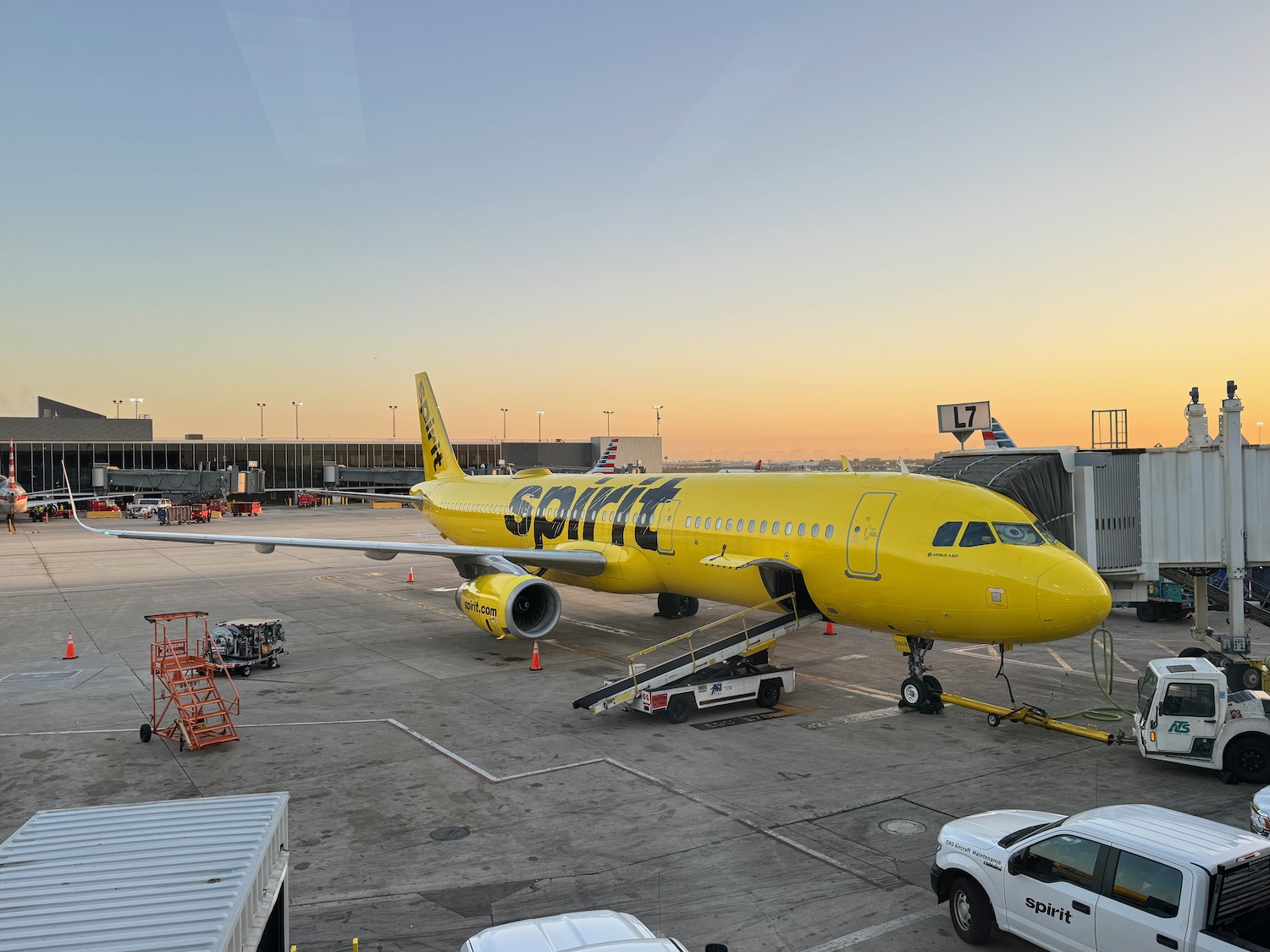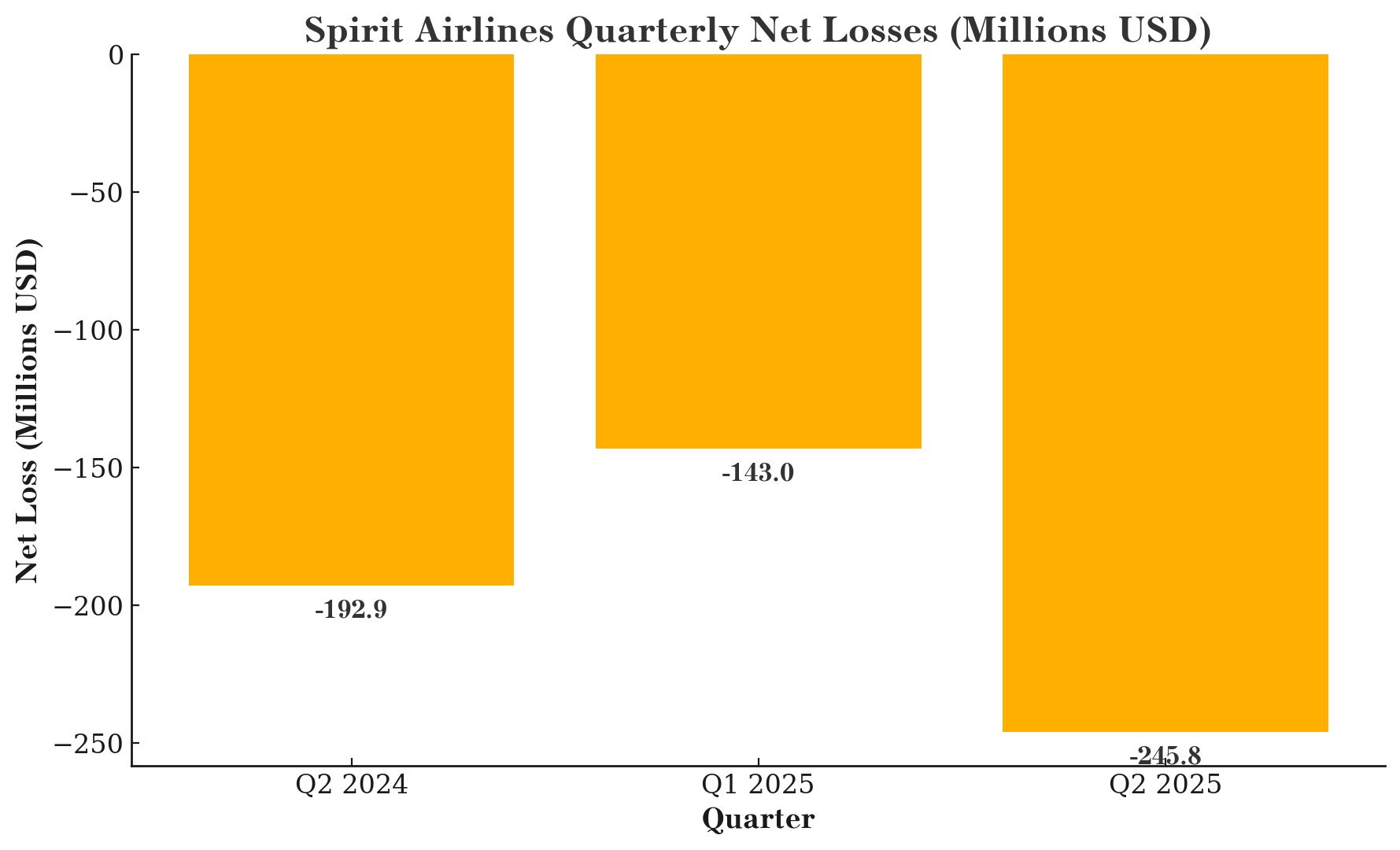
Spirit Airlines just dropped a financial bombshell—a bleak warning about its survival, leaving little doubt that the airline may not make it through the next year without drastic change or another rescue. We should never have reached this point.
Spirit Airlines Sounds Dire Survival Alarm As Cash Crisis Looms
Spirit’s latest SEC filing includes a chilling formal statement from management:
Because of the uncertainty of successfully completing the initiatives to comply with the minimum liquidity covenants and of the outcome of discussions with our stakeholders, management has concluded there is substantial doubt as to our ability to continue as a going concern within 12 months from the date these financial statements are issued.
It’s not often that a public company so openly states that it may not exist in a year, but Spirit has broken that silence. The warning underscores failed turnaround efforts, dwindling liquidity, and heavy debt. The warning echoes what I noted back in 2023…that this might end very poorly for Spirit.
Let’s revisit my earlier post deconstructing Judge William Young’s decision to block the merger with JetBlue. I observed then that the activist ruling was detached from market reality and more importantly, fundamentally misconstured the Clayton Act. The judge seemingly refused to see the obvious: Spirit needed scale or capital, and blocking the merger with JetBlue choked both and did nothing to preserve competition.
At the time, I wrote:
The keyword here is substantial. Would there be a “substantial lessening of competition” because of this merger? I don’t see this proven by the US Government or its expert witnesses. Rather, I see such forecasts as inconclusive and therefore unpersuasive. There remains tremendous competition in the US airline industry…the status quo cannot continue if both JetBlue and Spirit continue to lose money.
Fast-forward, and it’s not Spirit shareholders or boards issuing the warning…it’s Spirit’s management. The judge’s logic has aged horribly. His decision may well go down in travel industry history as the ruling that helped push Spirit Airlines into a death spiral. And the latest Q2 2025 numbers are grim:

As JetBlue, Frontier, and Spirit flounder, I’m not sure what the solution is, if any, at this point. But whatever happens, I see consolidation as the only path to survival.
And while I’d love to see Northwest, US Airways, Continental, and Virgin America still operating as independent carriers, airfare has dramatically dropped in price over the years…at least in terms of pricing, we are in a golden age.
I’m Rooting For Spirit…
I may poke fun at some of the Spirit clientele, but I’m rooting for Spirit Airlines…I always root for competition in the airline marketplace. But it has become clear over the last several months that the Spirit business model is no longer tenable. As Spirit faces difficulty in renewing a contract with its credit card processor over reasonable chargeback fears, the carriers’ decline will only accelerate because this news will stop people from purchasing tickets more than a month or two in advance.
Frankly, I don’t see how Spirit can make it…consumer preference ash changed and the legacy carriers have done a superior job offering a wide range of products, including basic economy that, even if a tad more expensive, often offers a superior value proposition to Spirit.
Even so, Spirit keeps pricing in check on other carriers and offers valuable competition in an environment in which network carriers are salivating for budget carriers to fail so that they can raise prices.
I don’t know what to say at this point other than I hope that Frontier or JetBlue can still find a way to acquire Spirit aircraft, routes, personnel, and other assets to more meaningfully compete with other carriers. I don’t believe the success of Ryanair or EasyJet is unique to Europe…I do believe there is a market for budget carriers in the USA, but the high cost of doing business at major airports and rising labor costs makes it far more difficult here than across the Atlantic.
CONCLUSION
Spirit Airlines is officially on life support. The candid disclosure of “substantial doubt” is a rare and dire message. Unless something changes fast, like a merger deal, investment lifeline, or operational windfall (all of which are highly unlikely), we may be watching the final chapter of Spirit Airlines’ independent identity. Let’s hope the embers of its once-proud ultra-low-cost model can survive this winter, but it’s not looking good right now.




“the carriers’ decline will only accelerate because this news will stop people from purchasing tickets more than a month or two in advance.”
It might also encourage a good chunk of it’s employees to start looking for employment elsewhere if they feel they won’t have a job within a years’s time. That in turn could also affect it’s operations making things even messier.
As much as I hate to say it, you are 100% correct on this take.
Biden killed Spirit. The consumer was hurt, not helped. That doesn’t mean Trump is great.
No. The Biden administration did not “kill” NK. They blocked a merger that would have also done away with NK, so let’s not misrepresent what happened. While I don’t agree with their decision, they did not kill it.
Like almost every UA airline, NK is losing on core operations…flying planes. Fares, adjusted for inflation, are as cheap as they have ever been while costs, and in particular labor costs, have shot through the roof. The only way the big four make this work is through credit card deals and selling miles. The LCCs and ULCCs do how have the customer base to do that.
Frontier, JetBlue and Avelo are all in the same boat. By the time we’re done there will be 1 or 2 ULCCs that survive: Allegiant (which is making money) and another one that has national scale.
What in your view is Allegiant doing right that the others are not?
Being the only option in many markets is their key. Along with not having a reputation for attracting the worst customers.
Sounds like this works out for B6 in the end.
They can now pick up Spirits planes and pilots for pennies on the dollar, and the current administration being business friendly won’t be an obstacle.
JetBlue isn’t doing so well itself. Taking on more debt is the last thing they should do.
Bizarre that they announced this. There must be a twist that is missing. Airlines don’t tell you they are going bankrupt soon. They just go bankrupt. Unless something else is at play here…and I imagine there is.
I agree with this take. I can think of several things they’d be trying to telegraph with this announcement, any of which would make sense:
– The most simple is just that they’re publicly begging for more money by expressing how bad the situation is
– Another option is that they’re begging B6 or F9 to come back to the bargaining table
– Most interestingly, they’ve likely already spoken to B6 and F9 and this announcement is pointed at the government, letting them know that if they don’t approve a merger this time around it will be lights out for NK.
Honestly, if it’s the last option this is probably a decent move. They have the numbers to prove they’re going out of business and opening up about that probably increases the probability of a merge being allowed dramatically.
Exactly what I was thinking. They are lining up for suitors and assuring that they won’t be impeded on in their airline tinder game.
There is a twist, but it’s not nearly as exciting as you think it is. When a company is circling the bowl, professional standards require the independent auditor to force the inclusion of the “going concern” footnote in issued financial statements, or they are not permitted to sign off on the audit. This isn’t a footnote management wants in their financial statements, nor is it something any CPA really enjoys pushing their clients on – so the financial situation’s got to be REALLY bad for that to get in there.
It is not at all bizarre they announced this. It is their fiduciary duty to issue a going concern warning when the financial outlook is bleak. The Spirit board would be opening themselves up to lawsuits if they did not issue a going concern warning when they are hemorrhaging this much cash with no foreseeable way to stop the bleeding.
Could Spirit have been run any worse? Doubtful. They made strategic mistakes time after time. Ticking off as many customers in a day as is possible is not a way to see yourself as a long term going concern. People have long memories, especially airline issues. Perhaps Judge Young did us a favor.
Actually, i think if the jetBlue-Spririt merger had happened, i suspect they both would be advertising “going concern” issues about now. Possibly loosing 2 carriers instead of one.
Mergers almost never benefit consumers in the end. The problem is that there is simply too much capacity in the U.S. market. Frontier and Spirit really gained their ground when interests rates were near zero but, just like almost everybody else, their business model/lifestyle is unsustainable when interest rates go up. Everybody got drunk on the low interest rates and flooded the market with capacity – you didn’t need a business plan. Unfortunately, it is inevitable that only the strong will survive in a world of higher interest rates and glut of capacity market. Frontier may be headed down the same path but at a slower rate. Interest rates, excess capacity, and inflation/consumer pullback will wreck any airline who runs on rock bottom prices and slim margins whose target customer is the most affected by adverse economic conditions. I know everybody wants to blame the Biden admin for the merger falling a part but several other state attorneys joined in which tells me they were just as concerned as the DOJ.
It’s impossible to not compare Spirit to airlines like Ryan Air and Air Asia and Wizz. I think where they differ is Spirit seemed to rely on hubs a bit more than European competitors, and left a lot of markets still unserved. I also think the concept of a budget holiday doesn’t exist in North America. Sure, you might snag tickets on Spirit for $29, but what good does that do you when once you get to your destination, you’re looking at hundreds of dollars in Ubers or a rental car, paired with a pricy hotel and dining in restaurants. Public transportation and truly cheap accommodation make European (and Asian) LCCs work.
Spirit didn’t really make people take more trips, it made people decide to fly to Ft. Lauderdale or Orlando instead of drive there. What surely must be profitable for Spirit are their LATAM routes; especially those to Colombia and Central America. I would assume another LCC will scoop up that demand if they exit the market.
taxpayer support for the entire economy including airlines during covid did enormous damage and kept the rationalization of capacity and the failure of an airline or two from happening.
NK really has nothing of value; their planes are leased or mortgaged which means financial institutions will determine their future.
More than one airline has failed when their credit card agreement is tightened.
I want to keep Spirit flying — if only for the fact that I want their clientele to remain on Spirit aircraft, and not MINE!
Thank god Spirit wasn’t allowed to merge with JetBlue. That would have sunk JetBlue like a lead balloon.
Their stock is $1.89. If it goes to $1.50 a share I’d take that chance if they get bailed out by the government. 5 years from now it will be back up to $12 per share.
How can scale be an issue when Spirit has almost 200 aircraft to its name? In a European context, only RYR and EZY would be bigger (short haul airlines) and Air Asia is around the 250 mark, including the Air Asia X fleet.
In a macabre way, I’m sure Frontier, Breeze, Allegiant and JetBlue are rooting for Spirit’s demise. Even though Spirit has a small slice of the US market, it’s just one more competitor out of the way. The remaining LCC carriers will fill in the gaps with minimal effort.
As for the trunk line carriers, each will scramble for gates at LAX, ORD, LGA, DCA, & EWR. As for United, it could develop FLL into the southeast hub its always wanted with connections to Central and South America just like AA at MIA.
Analyst and accountants at each airline are crunching numbers as we speak. Each have drafted multiple scenarios.
We’ll see who has the best outcome.